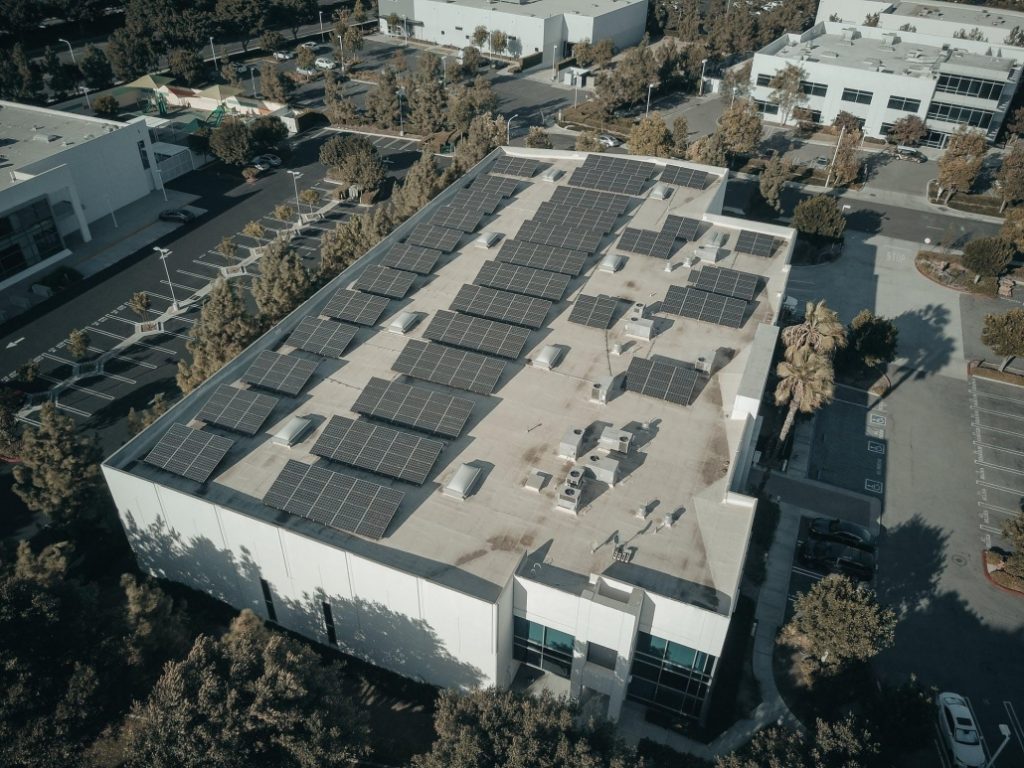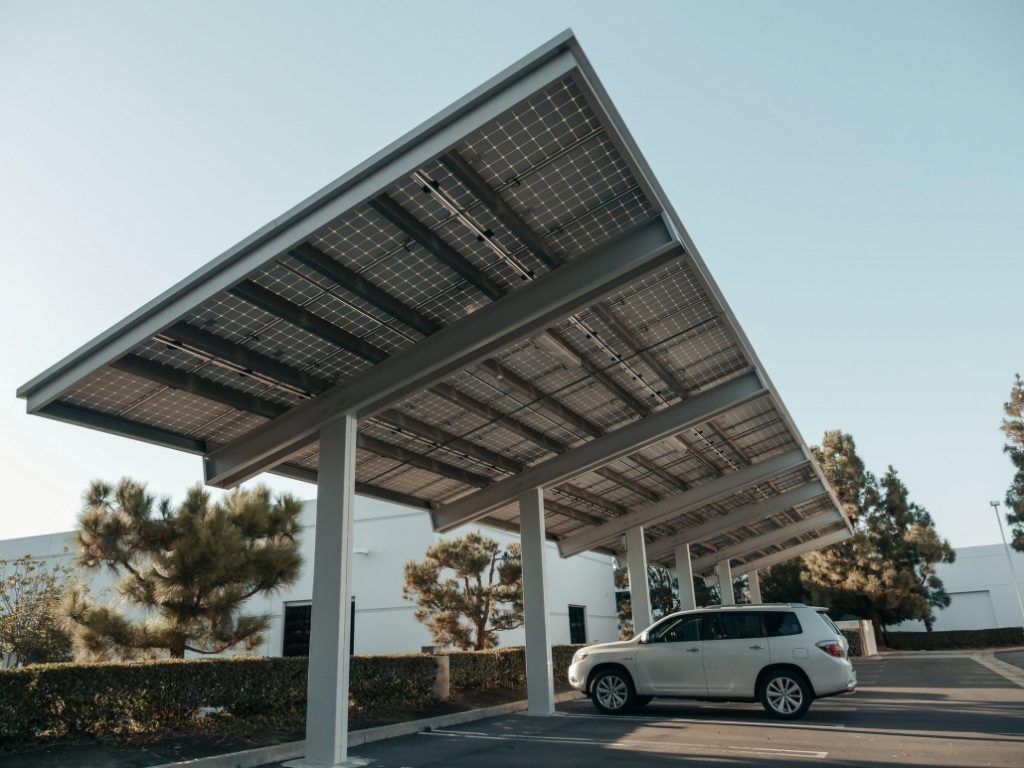The Commercial Solar Installation Guide
– A Brief Introduction
There’s no denying it – businesses are going green. From big-box grocery stores to mom-and-pop antique shops, companies everywhere are realizing the benefits of solar energy and making the switch.
The reasons are twofold.
First, more businesses are growing to understand that solar energy is a cost-effective way to power their establishments. According to a study conducted by the National Renewable Energy Laboratory, commercial solar panels have a payback period of just three to four years.
That’s impressive, especially when you compare it to other traditional forms of energy generation like coal or natural gas.
The second? Customers are flocking to green businesses that display an earnest desire to operate in an environmentally responsible way. In a study conducted by Nielsen, it was found that 66 percent of global consumers are willing to pay more for sustainable goods. Making the switch to green energy is not only better for the environment — it’s better for attracting new customers and increasing your prices, too.
In this guide, you’ll get a comprehensive overview of commercial solar panels. We’ll discuss some reasons why you should consider going solar, the various benefits of a robust solar system, how solar panel efficiency works, and the incentives and rebates available to environmentally conscious businesses like yours.
Ready to go green? Let’s get started!

PANELS, MODULES, AND PV SYSTEMS
First, some quick definitions. In the context of this blog, the term solar panel generally refers to the entire solar energy system — microinverter, controller, and all. This term is interchangeable with solar module, so if you see one or the other in industry literature, you should know that they refer to the same thing.
Additionally, PV system stands for photovoltaic system, and is the main way solar panels and systems are commonly described by professionals.
WHY SHOULD BUSINESSES USE SOLAR PANELS?
Solar energy isn’t a fad — it’s a reliable, sustainable resource that offers much in the way of cost-effectiveness, scalability, and ROI.
In particular, there are three main benefits as to why you should go solar with your business:

1. Cutting your energy costs and saving money on utility bills
On average, commercial solar panels pay for themselves in three to five years. After that, your energy is free — every kWh of solar energy produced by your system is one less kWh you need to buy from the grid, saving you money on your utility bill.
As if that’s not already good enough, governments and utilities are offering ever-increasing incentives and rebates for businesses that go solar. You could save thousands of dollars on the cost of your system set-up — and that’s money you can use to grow your business directly, rather than simply handing it over to a utility company.
2. Reducing your company’s carbon footprint
Solar panels reduce greenhouse gas emissions and help businesses move towards a more sustainable future. Every 1 MW of solar offsets the equivalent of 31,500 metric tons of CO2 emissions.
Historically, companies have been the largest net generators of greenhouse gas. But that’s changing. The US, for example, now has nearly 114 GW of cumulative installed solar electric capacity, enough to offset more than 127 million metric tons of CO2 emissions. And that number is only growing.
By going solar, you can help your business reduce its environmental impact and become a leader in the global fight against climate change.
3. Attracting environmentally conscious customers
In the 2021 Global Sustainability Study, 34% of consumers said they were willing to pay a premium for sustainable products.
Offering solar installation is a great way to show your customers that you’re committed to sustainability and to reducing your carbon footprint. And as the zero-waste movement continues to gain traction, this means more and more consumers will shop preferentially with businesses that align with their values (like yours).
Going solar is a win-win for companies of all sizes. Not only does it save you money on energy costs, but it also helps the environment and can attract more customers.
Ready to make the switch? Hoymiles can help you with the perfect solar solution – find a distributor today.

BENEFITS OF SOLAR PANELS FOR BUSINESSES
Though the initial investment in a solar installation can be costly, businesses reap significant benefits over time. Some of the top benefits of solar panels for businesses include:
Increased property value
Solar installations add considerable value to a commercial property and can make it more attractive to potential buyers. Studies have shown that properties with solar panels sell up to 20% faster and for 15% more than those without them.
Tax breaks
Businesses can also take advantage of various tax breaks and incentives for installing solar panels. For example, in 2019, the U.S federal government offered a 30% tax credit for commercial solar installations. That number is now 26%, but it’s still sizable enough for any business to get fantastic mileage out of.
Improved energy independence
Solar panels allow businesses to become more energy independent, which is especially important for companies that rely on centralized grid power. When a solar system is paired with an efficient battery storage system, businesses can even go off-grid completely.
Marketing benefits
Solar installations also provide a strong marketing opportunity for businesses. By going solar, companies can display their environmental consciousness and commitment to sustainability. This can be a major selling point for eco-concerned customers and can help attract new business.
Environmental benefits
Naturally, solar installation also has a host of environmental benefits. It reduces greenhouse gas emissions, helps conserve energy resources, and decreases the use of harmful fossil fuels.
Reduced electricity bills
Once your solar system is up and running, you’ll start generating your own power from the sun. This means that you’ll no longer have to purchase electricity from the grid, which can result in significant savings on your monthly utility bill.
Increased resiliency
Solar installations make businesses more resilient to power outages and grid failures. When the grid goes down, businesses with solar panels can still generate power for their operations.

HOW EFFICIENT ARE COMMERCIAL SOLAR PANELS?
In just a few years, solar panel technology has made incredible strides in efficiency. In 2010, the average solar panel had an efficiency rating of about 14%. Today, that number has jumped to between 15%-20%, and there’s still plenty of room to grow.
What does this mean? A 13% efficiency panel can produce 130 watts of energy from 1,000 watts of sunlight. A 20% efficiency panel, on the other hand, can produce 260 watts of energy. As efficiencies improve, the returns on solar energy relative to their up-front cost will continue to go down, making solar panels an increasingly attractive investment for businesses of all sizes.
What makes a solar panel efficient?
Solar panel efficiency is a product of a number of factors, including the materials used in the panel, its design and construction, and the local climate.
Reflectivity
One important factor is reflectivity. A well-designed panel will have glass with a low reflection coefficient, meaning that most of the sunlight that hits it will be absorbed and converted into electricity. Panels with high reflectivity will lose some of the sun’s energy as it bounces off the surface.
Material type
Perhaps the most important factor in efficiency is the type of material used in the solar cell. Today, most commercial solar panels are made with monocrystalline or polycrystalline silicon. Monocrystalline solar panels are composed of a single, large crystal of silicon and are generally more efficient than their polycrystalline cousins. Most of the modern, high-efficiency commercial solar panels are thus monocrystalline.
Operating temperature
Generally, a suitable operating temperature range for solar panels is between 59°F and 95°F. Most panels are tested ~77°F, but when you start to get significantly hotter or colder than that range, efficiency drops substantially.
Though many consumers believe otherwise, hot climates like Texas or Arizona are ideal for solar energy not because of their hot weather, but because of their long, sunlit days – their warmer temperatures actually hamper the energy production of solar panels in these regions because high temperatures cause silicon to produce more heat than electricity.
Efficiency is ever-growing
Scientists predict that there’s still significant room to grow solar panel efficiencies, and there are no indications that this technology is slowing down any time soon.
Case in point? Newer solar panel technologies like PERC (passivated emitter and rear contact) and HIT (heterojunction with intrinsic thin layer), are even more efficient than solar panels made just a few years ago, often reaching efficiencies as high as 25% or more.
It’s important to note, however, that these newer offerings are typically more expensive, and the experimental nature of some of them means that their long-term reliability is still up for debate.
DO YOU NEED PLANNING PERMISSION FOR SOLAR PANELS ON COMMERCIAL BUILDINGS?
Many commercial properties were not designed to accommodate solar panels upon initial development. For that reason, it’s important to verify whether or not you need planning permission from your local municipal or business authority before you proceed with a commercial solar panel installation.
Some councils will require you to submit detailed plans and/or go through a planning process, while others may not require any form of planning permissions for your commercial property at all. It depends on the age of your building and whether it was designed specifically with solar in mind.
The good news is that many municipalities are pro-solar and are eager to help businesses make the switch. They’re generally accommodating, and the majority of them are happy to walk you through the process – all you need to do is ask.
Here are a few things that municipalities may look for when establishing planning permissions:
● How will the installation impact the appearance of the building?
● Will any trees need to be removed to make way for the panels?
● How will you accommodate access for maintenance and cleaning?
● What is the load-bearing capacity of your roof?
● Are there any restrictions on what type of solar panel can be installed?
If you’re unsure about whether or not your commercial property requires new planning permissions, it’s best to speak to your local council or an experienced solar installer in your area.
Need help finding an installer? Hoymiles is a company of solar professionals with an extensive network of experienced installers in every region – reach out now.
SOLAR PANEL GRANTS FOR COMMERCIAL BUILDINGS
One of the best parts about going solar is the variety of grants and incentives available to help businesses pay for their systems.
For example, the U.S federal government currently offers a 26% tax credit for commercial solar installations, and many states and municipalities have their own programs specific to commercial solar panels. Solar tax credits take into account the cost of the solar panels, additional components like microinverters, and the installation process.
Other U.S programs exist that cater to specific types of businesses, like the Rural Energy America Program (REAP). REAP offers grants of up to US$500,000 for companies that invest in renewable energy systems.
If you’re not in the U.S, you’ll be happy to know that most countries around the world similarly encourage solar adoption. France, for example, lets you sell your excess solar energy back to the grid. The Netherlands, alongside offering a generous energy tax rebate, has a special grant program called SDE+ that had a budget of over €5 billion in 2021.
A real example: our local solar partner Ralos helped two large Finnish manufacturers, Hakola and VM-Carpet, get a whopping 20% government subsidy on their solar system installation. Factories are notable for being incredibly large energy consumers, so their decision to upgrade has yielded dividends both financially and environmentally. These two factories are now completely energy-independent, and receive 100% of their energy from the sun.
If you’re planning on going solar, we highly recommend looking into the incentives available in your area. Subsidies, grants, and tax credits can significantly offset the cost of installation, and make the switch to solar much more affordable for most businesses.
Unsure of how to do this yourself? Hoymiles happily connects eligible businesses with local solar installers that know their regional grant programs inside and out. It takes just a few minutes to sign up.
THE AVERAGE COST OF COMMERCIAL SOLAR PANELS
The average cost of commercial solar panels varies based on the size of the system you need and your commercial energy requirements.
According to a recent study by the National Renewable Energy Laboratory (NREL), commercial rooftop photovoltaic systems cost less than US$2 per watt on average. That’s down from nearly US$4 per watt in 2008, and is expected to continue dropping as solar technology improves.
Smaller residential systems (like those between 10 and 100 kW) have seen a similar decline in price, and currently cost around US$2.50 to US$3 per watt. So, while the overall cost of solar is dropping, economies of scale still apply – larger commercial systems are usually going to be more affordable than smaller residential ones.
This means that the greater your business energy needs, the more you’ll have to pay in absolute, up-front costs. Likewise, the per-watt cost of your system will be lower, turning solar into an even more financially prudent investment.
Average cost of installation
A significant portion of the cost of commercial solar panels is the price of labor. On average, the cost of solar installation labor is around US$0.30 per watt or 10%-20% of the cost. So a 100 kW system would cost around US$30,000 to install – but that number will vary depending on your location and the company you choose to do your installation.
A reminder: these fees are the gross cost. Solar panel installation rebates and grants can often significantly reduce how much your business will pay.
Maintenance costs
Another thing to consider is the ongoing cost of maintenance. Solar panels are generally very low-maintenance, but there are certainly going to be some costs associated with regular cleaning and the occasional repair.
For example, if birds commonly leave droppings on your panels, this can lead to significant staining and decreased efficiency. Likewise, if a panel gets scratched or damaged, you’ll want to fix it as soon as possible to mitigate energy loss.
Usually, annual or semi-annual maintenance will suffice.
Other costs
Lastly, there are a few other incidental costs you may want to consider. For example, you may need to pay for a permit if your business property resides in a regulated area. You may also need to upgrade your electrical infrastructure to accommodate the influx of solar energy.
An experienced solar panel installation company can help you determine these costs ahead of time, as well as factor in subsidies, rebates, and grants. Reach out today and see how Hoymiles can help!
